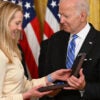MADISON, Wis. – Joy and jubilation.
That was the response late Thursday from opponents of the controversial Common Core State Standards after Gov. Scott Walker announced he wants Wisconsin to do away with the nationalized education template.
“Today, I call on the members of the state legislature to pass a bill in early January to repeal Common Core and replace it with standards set by people in Wisconsin,” Walker said.
The statement may have been short, but it sounded sweet to Marcia Alder, mom of three students in West Bend.
“Thank God. It’s about time,” she said after Wisconsin Reporter informed her of the governor’s announcement.
“I’ve been fighting this for three years, trying to get through to people what this is,” said Alder, who testified against the process of implementation at legislative hearings earlier this year.
Walker spokeswoman Jocelyn Webster said the Cedarburg School Board’s appeal to lawmakers to delay Common Core as well as the “ongoing issues local school districts face with the standards” convinced the governor it was “important to make his position clear.”
“Gov. Walker will work with the Legislature to repeal Common Core and replace it with strong Wisconsin-specific standards developed by Wisconsin teachers, administrators and parents,” Webster said in a statement to Wisconsin Reporter.
The governor previously said the Badger State should develop its own academic standards, but Thursday marked the first time he called for an outright repeal.
Walker received key early backing from a powerful legislative ally, State Sen.Alberta Darling, R-River Hills, co-chairwoman of the Legislature’s Joint Finance Committee.
“I support Gov. Walker’s call for an end to federal Common Core standards in our state,” Darling said in a statement. “I know there is support on both sides of the aisle to end Common Core and develop new standards that challenge and prepare our students for the real world of work.”
Wisconsin was one of the first states to jump on board the Common Core train. The national standards for reading and math at one time had the backing of 46 states.
But support has eroded, with conservatives in particular leading the charge against what they see is a usurpation of local control.
Indiana, Oklahoma and South Carolina haverepealed or formerly withdrawn from Common Core, and several other states are considering following suit.
Louisiana Gov.Bobby Jindal supported the standards in 2010 but has since called on the Louisiana legislature to replace them with Louisiana standards.
Earlier this week, theOklahoma Supreme Court ruled the state legislature had the authority to repeal the education standards for English and math in the state’s public schools.
Wisconsin’s legislature held a series of hearings into Common Core, but only afterWalker said he supported airing the matter out in public.
Those hearings resulted in legislation that would create an academic standards board that could adopt new standards and periodically review them. The bill would remove that power from the state superintendent of public instruction, who currently has sole authority to adopt state standards.
Assembly SpeakerRobin Vos, R-Rochester, supports the governor’s call for “strong Wisconsin-based standards,” said spokeswoman Kit Beyer.
“This past session, several reforms were put forward after a special task force met and took public input. The Speaker was disappointed the proposals didn’t pass,” Beyer said. “He looks forward to working again on replacing Common Core with higher standards that are developed in our state.”
It was the state Department of Public Instruction that drove implementation, without opening up the standards for public hearings.
DPI officials did not return requests for comment.
The issue is becoming alitmus test for Republicans, especially among their tea party constituency, this primary season. Both the state and national Republican Party platforms reject Common Core standards.
Earlier this year, members of the GOP’s 2nd, 4th and 6th congressional district caucuses passed resolutions declaring “no confidence” and “no support” of Sen. Luther Olsen of Ripon and Rep. Steve Kestell of Elkhart Lake, chairmen of the Senate and Assembly committees on education, respectively. Olsen and Kestell represent portions of the 6th congressional district.
“These resolutions are not binding resolutions; nobody is going to fire them from the GOP,” Michael Murphy, vice chairman of the Republican Party’s 4th congressional district, told Wisconsin Reporter at the time. “It does show the party does not support what they are doing.
“It’s more of a public flogging, if you will, from our delegation.”
Common Core testing is slated to begin next spring. That’s what worries Alder most.
“All three of my children have been guinea pigs at their school to test that test,” said Alder, whose children are in middle school and high school.
Alder said she has read the Common Core State Standards, which spans about 1,000 pages, including appendices. The standards, Alder said, dumb down education for higher-achieving schools.
“If you are in a failing school system like Milwaukee Public Schools, I’m sure Common Core would seem like a Godsend to you, but for more advanced schools, it’s slowing them down,” she said.
Tracie Happel, a second-grade teacher in La Crosse, calls the governor’s call to repeal Common Core a “huge victory for the kids in our schools.”
She went through the piloting of the standards last school year. Happel said the problem with the Common Core Standards can be found in its name.
“The biggest problem is the standardization,” Happel said. “Our kids are all different and unique, and I would like to see them honored that way, as unique individuals.”
Happel said sentiments on Common Core are mixed among her colleagues, but teachers who are opposed are afraid to speak out.
Common Core supporters, including Wisconsin Superintendent of Public Instruction Tony Evers, say the standards will level the educational playing field by replacing the mediocre benchmarks that have plagued Wisconsin public education with greater rigor.
“The Common Core standards finally make real the promise of American public education to expect the best of all our schoolchildren,” said Michael Casserly, executive director of the Council of the Great City Schools, which represents the nation’s largest urban school districts.
For critics such as Alder, it’s time to put local control back in the educational standards question.
“This is something that needed to be done,” she said of Walker’s statement on repeal. “I think people were too afraid to stand up and be counted. I think now that other states are beginning to do this, (the governor) is following suit.”



























